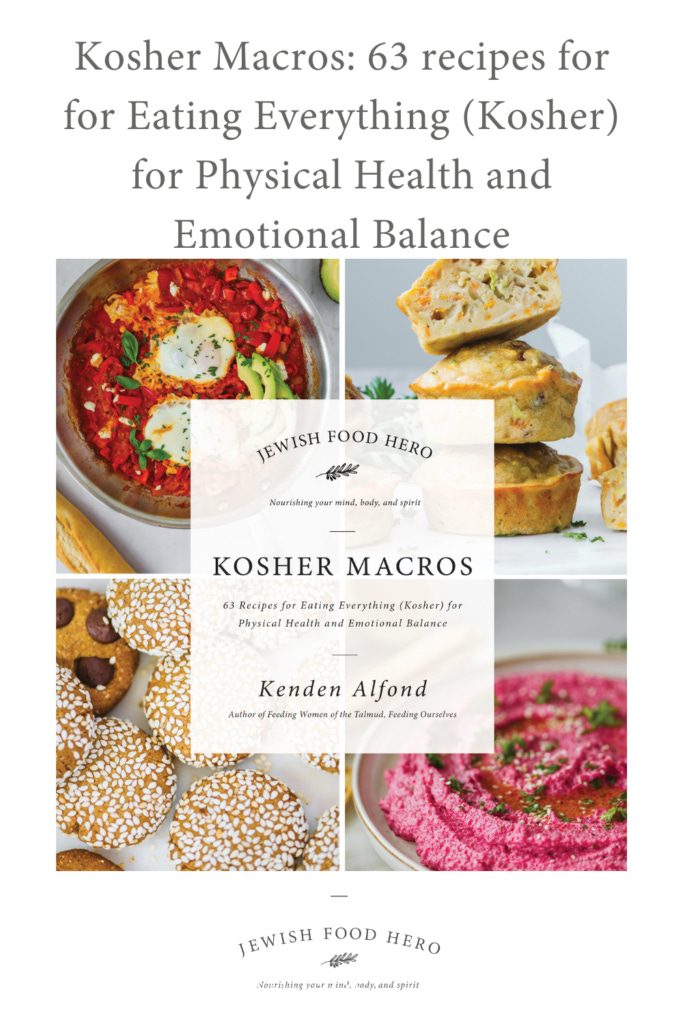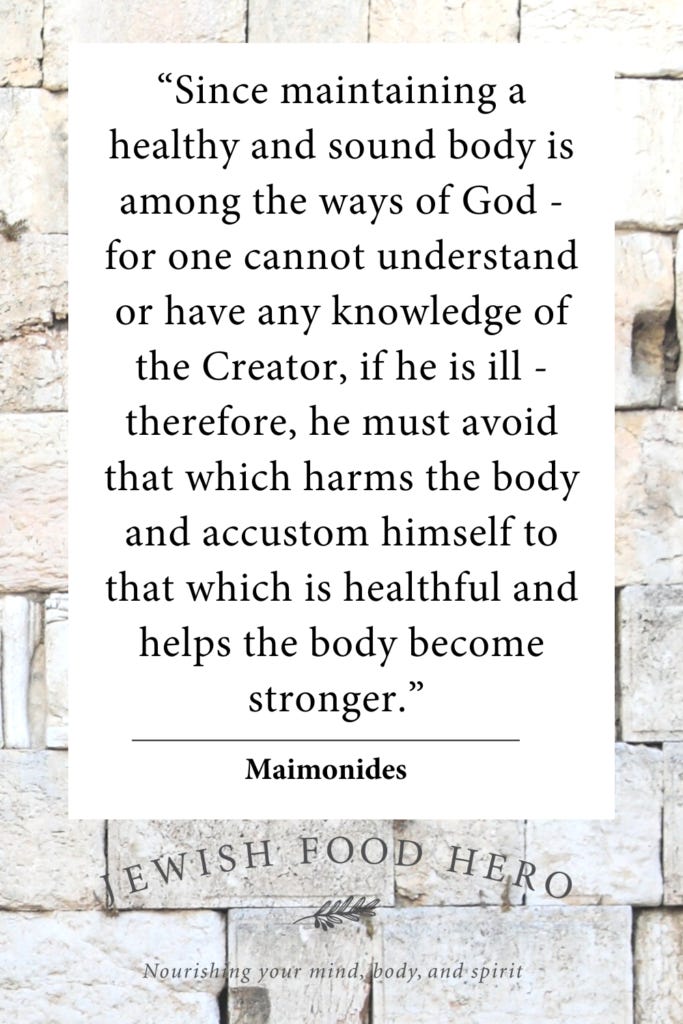Complete List of Maimonides' Health Do's and Don'ts
Maimonides' guidance on eating, digestion, bathing and sleep
I thought it might be fun for us to study this text together and reflect on Rabbi Moshe ben Maimon's (Rambam, also known as Maimonides) Health Dos and Don'ts. You know, in times of stress and suffering, it's often helpful to shift our focus to something else. It's a bit like the psychology idea that when life gets tough, engaging in activities like studying can be a way to take a breather and find a different perspective. So, let's dive into Maimonides' insights on healthy living and see how they relate to our daily choices and habits.
Rabbi Moshe ben Maimon (Rambam, also known as Maimonides), the great intellectual and spiritual figure of post-Talmudic Judaism, documented clear instructions for healthy eating, digestion and exercise.
Gendered language
These original texts often use male-gendered language. I have preserved the original language out of respect to the text, but we know deep inside that Maimonides was talking to women too!
Warning against extremes; advocating for rest and routine
In Mishneh Torah, Human Dispositions composed during the Middle-Age (c.1176 – c.1178 CE) in Egypt he wrote about the dangers of extreme behaviors and overeating, and the importance of healthy bowel movements and naps. This book also contains his thoughts about basic character traits and proper sexual relations (he advocated for mutual consent!).
You can read the whole text here on Sefaria. The Mishneh Torah (“Repetition of the Torah”), also referred to as Yad HaChazakah (“The Strong Hand”), is a monumental legal code and one of the most organized, comprehensive, and influential works of Jewish law. Written over a period of ten years, the work systematically categorizes and clearly explains all aspects of Jewish observance, including those applicable only in Temple times.
In this post, I’ll be focusing on his food, eating and health advice. This feels particularly resonant to me since moving forward from strict veganism to kosher omnivore. Adopting a Kosher Macros approach made it easy to re-learn how to eat everything (kosher) in balance. I loved this transition so much that I decided to collect my favorite kosher macros recipes in the cookbook Kosher Macros by Jewish Food Hero
Now, let’s take a look at Maimonides’ key advice that is still relevant today.
Principle of Moderation: The Middle Path.
In Chapter One, Maimonides lays out a basic principle of moderation. He writes that if a person finds “that his nature leans towards one of the extremes or, if he has learned one of the extremes7 and acts accordingly, he should bring himself back to what is proper. and walk in the path of the good.“
Above he notes that some people are extreme by nature – meaning that extreme thinking, feeling or acting patterns seem to be a part of their personality – whereas others learn and adopt extreme thinking, feeling and action patterns. Regardless of the origin, both people are advised to pull themselves back from extremes.
For Maimonidies, the “path of the good” or “straight path” was the “middle path” or midpoint between extremes:
“The straight path: This [involves discovering] the midpoint temperament of each and every trait that man possesses [within his personality.] This refers to the trait which is equidistant from either of the extremes, without being close to either of them.”
Don’t Harm your Body + Do Adapt Yourself to Healthy Behaviors
Maimonidies posited that a healthy body was one of the “ways of God” and it was an essential prerequisite to “knowing” God.
“Since maintaining a healthy and sound body is among the ways of God – for one cannot understand or have any knowledge of the Creator, if he is ill – therefore, he must avoid that which harms the body and accustom himself to that which is healthful and helps the body become stronger.”
We can understand this to recommend doing these things simultaneously:
Avoid harming your body; distance yourself from unhealthy health behaviors.
Get used to taking actions that maintain and increase the health and strength of your body.
Maimonides’ Food and Eating Advice
Maimonidies recommended we follow our hunger and thirst cues:
“a person should never eat unless he is hungry, nor drink unless thirsty”
“Overeating is like poison to anyone’s body. It is the main source of all illness. Most illnesses which afflict a man are caused by harmful foods or by his filling his belly and overeating, even of healthful foods.”
Maimonides is crystal clear that overeating damages our body. This includes overeating any food – including “healthy” food – because it is harmful to the body and leads to illness.
“There are foods which are extremely harmful and it is proper that one should never eat them.”
Maimonidies lived in a different time, yet the basic principle he proposes is timeless: some foods are simply not fit to eat as they only do harm. If Maimonides were alive today, perhaps he would write at length about processed and ultra-processed foods. Sugar, salt and oil are added to processed foods in unnatural excess for taste and to increase shelf life. Ultra processed foods would certainly be on Maimonidies avoid list as they add yet more and increasingly obscure and chemical ingredients to manipulate taste. Soft drinks, chips, chocolate, candy, sweetened breakfast cereals, packaged soups, chicken nuggets, hotdogs, fast foods – processed and ultra-processed foods are readily available, cheap, time-saving and frankly addictive. I do not think Maimonides would have approved.
“When the wise man eats the little which is fitting for him”
Maimonides advocated that we eat the right amount of food for our particular body. I think he would have supported the idea of “portion size” and “portion control”. This was an essential part of my transition to following a Kosher Macros dietary pattern. Most people have no idea about portion size and how key this is to eating correctly for your own body. If this approach to eating everything in balance interestes you, make sure you check out Kosher Macros: 63 recipes for for Eating Everything (Kosher) for Physical Health and Emotional Balance.
“He should eat only in his own home, at his table. He should not eat in a store or the marketplace.”
He thought a person should home cooked meals at the dinner table. He was not a big fan of eating out or eating on the run.
Maimonides would not have supported the YOLO (you only live once) approach to food – eat and drink with abandon because we will all die one day anyway. Nor would he have been at ease with our modern tendency to turn every meal into a special occasion feast with large quantities of rich foods and alcoholic beverages. Overeating is overeating, regardless of the occasion. Unfortunately, eating the right amount of food is extremely difficult in our times because of the omnipresence of food and social pressure to turn all food experiences into feasts.
Our Sages explain: These are the people who eat and drink and make all their days like feast days. They say, “Eat and drink, for tomorrow, we will die” (Isaiah 22:13)
He should eat food which will keep his body healthy, without overeating. He should not seek to fill his stomach, like those who stuff themselves with food and drink until their bellies burst. They are alluded to by [the statement of] the prophet [Malachi 2:3]: “I will spread dung on your faces, the dung of your feasts.” Our Sages explain: These are the people who eat and drink and make all their days like feast days. They say, “Eat and drink, for tomorrow, we will die” (Isaiah 22:13 . This is the food of the wicked.
Maimonides supported seasonal eating principles:
“In the summer, one should eat unseasoned foods without many spices and use vinegar. In the rainy season, one should eat seasoned foods, use many spices, and eat some mustard and chiltit (a sharp spice that is used as a digestive aid).
One should follow these principles in regard to cold climates and hot climates, [choosing the food] appropriate to each and every one of them.
Maimonides’ Advice on Bathroom Hygiene
Bathroom rule #1: listen to your body and go to the bathroom as soon as you feel the urge:
“He should never put off relieving himself, even for an instant. Rather, whenever he [feels the] need to urinate or move his bowels, he should do so immediately.”
Bathroom rule #2: Privacy is essential when it comes to going to the bathroom.
“He should stay away from all others and enter a chamber beyond a chamber, a cave within a cave, and relieve himself”
Bathroom rule #3: Don’t Talk While Going to the Bathroom
“One should not speak while relieving himself, even if there is great need.”
Maimonides believed that proper bowel movements were essential for lifelong health. Chronic constipation and straining to move your bowels led to illness.
“This is a cardinal principle in medicine: Whenever one suffers from constipation or has difficulty moving his bowels, serious diseases will beset him.”
Maimonides Believed in Sleeping 8 hours at night and napping
Maimonides believed that it is important to set an intention for mental and physical rest when going to sleep.
“Even when he sleeps, if he retires with the intention that his mind and body rest, lest he take ill and be unable to serve God because he is sick, then his sleep is service to the Omnipresent, blessed be He.”
Giving yourself three to four hours to digest your dinner meal. Eight hours of sleep every day is the ideal and rising early is the goal.
“Together, day and night make up [a period of] twenty four hours. It is sufficient for a man to sleep a third of this period; i.e., eight hours. These should be towards the end of the night, so that there be eight hours from the beginning of his sleep until sunrise. Thus, he should rise from his bed before sunrise.
He should not retire shortly after eating, but should wait some three or four hours.”
On the one hand, Maimonides did not advocate for sleeping during the day and on the other hand he stated that taking a nap before eating or after a bath could be benefiical.
One should not sleep during the day.
A nap before eating, after the bath, is very beneficial.
Maimonides’ Thoughts About Showering and Water Temperature
In Maimonides’ time, public baths were commonplace and they were for hygiene and therapeutic purposes. He recommended that people experience therapeutic water baths every seven days on a slightly empty stomach.
“The [proper] manner of bathing is that a person should go to the baths once every seven days. He should not enter [the bath soon after mealtime; nor when he is hungry, but when his food has begun to be digested.”
A person should bathe his body in hot but not scalding water and then bath in colder and colder water. He might agree with the current trend of ice baths.
“He should bathe the entire body in hot – but not scalding water – and his head, only, in scalding water. Then, he should bathe his body in tepid water, followed by bathings in successively cooler water, until he has bathed in cold water.”
Guidance for those who are experience illness
After I published this, Rabbi Butman from Chabad Cambodia wrote to me with the below teaching from Maimonidies. I understand it all except maybe the last sentence which feels paradoxical?
"All of these beneficial habits which we have stated apply only to a healthy man. In contrast, a sick person, or one who has a single organ which is not healthy, or one who has followed a harmful way of life for many years, each of these must choose different patterns of behavior in accordance with his [particular] illness as it is explained in the medical literature. Any change from the conduct which one normally follows is the beginning of sickness."
Moderation: Movement, Portion Control and Healthy Bowel Movements
Maimonidies thought that health was built on three behaviors:
Discipline to exercise and move the body regularly
Restraint against overeating – even “healthy food”
Regular bowel movements
If a person has all three, they will be less susceptible to illness and their health will increase.
“A principle with regard to physical well-being: As long as one exercises, exerts himself greatly, does not eat to the point of satiation and has loose bowels, he will not suffer sickness and he will grow in strength. [This applies] even if he eats harmful foods.”
The Mishneh Torah (“Repetition of the Torah”) Copyright by Moznaim Publications.
What are your thoughts on Maimonides’ advice for living?
Which of Maimondies health ideas resonates most strongly with how you live and take care of yourself?
Share your thoughts in the comments!
Thanks for learning with me!
Am Yisrael Chai
Kenden
















Very interesting to read
Thank you